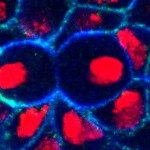Link to Pubmed [PMID] – 21965616
Development 2011 Nov;138(21):4585-95
Tight regulation of self-renewal and differentiation of adult stem cells ensures that tissues are properly maintained. In the Drosophila intestine, both commitment, i.e. exit from self-renewal, and terminal differentiation are controlled by Notch signaling. Here, we show that distinct requirements for Notch activity exist: commitment requires high Notch activity, whereas terminal differentiation can occur with lower Notch activity. We identified the gene GDP-mannose 4,6-dehydratase (Gmd), a modulator of Notch signaling, as being required for commitment but dispensable for terminal differentiation. Gmd loss resulted in aberrant, self-renewing stem cell divisions that generated extra ISC-like cells defective in Notch reporter activation, as well as wild-type-like cell divisions that produced properly terminally differentiated cells. Lowering Notch signaling using additional genetic means, we provided further evidence that commitment has a higher Notch signaling requirement than terminal differentiation. Our work suggests that a commitment requirement for high-level Notch activity safeguards the stem cells from loss through differentiation, revealing a novel role for the importance of Notch signaling levels in this system.

